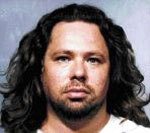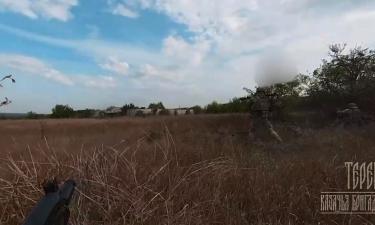The Ultimate Ukrainian Mobster
By Graham Phillips

Speaking out from her cell in Kharkiv, jailed former Prime Minister Yulia Tymoshenko has called on Ukrainians to "rise up against the mafia" she believes are running, and ruining, her country. Meanwhile, thousands of miles away, a man born just a few hundred kilometres, and a couple of years before Tymoshenko, widely reputed as one of Ukraine's most infamous mafioso, is fast becoming famous from his Panama cell, in the notorious La Joya prison. Not that Leonid "Tarzan" Fainberg (also known by a litany of aliases) restricts himself to a cell, as he wanders about what resembles a large shack, flirting outrageously with fellow 'female' inmates, preparing meals, and mostly giving every indication that, despite the filthy conditions and general bedlam, he's rather enjoying the whole experience. Even if incarcerated, Leonid Fainberg has never been one to let life pass him by.
Criminal Beginnings
Born in Odessa in 1958, in 1971 a young Fainberg and his parents (of Jewish origin) emigrated to Israel. Later, he tried out for the Israeli Marines, apparently wanting to become a Navy Seal. However, he failed to pass basic training and, when he again failed the army's officer exam, his pride was dented, and the young man decided to look further afield. Fainberg's 'career path' followed a descent through the realms of criminality. 1980 saw him in Berlin, going under the name Ludwig, and scraping out a living as a 'runner' for local mobsters, while carving out his own niche in extortion and credit card fraud. When one hit went wrong, Fainberg narrowly avoided a serious beating by rival Russian mobsters, and decided it was time to move on.
Having learned his trade, he headed for the United States in 1984. With his thick, long, chestnut hair (which along with his uninhibited behaviour, and muscular physique, earned him the moniker 'Tarzan') and handsome appearance, he was every inch the aspiring émigré. However Fainberg's designs on the 'American Dream', were always criminal, with his believing it easier to steal and extort in the "Wild West". Ostensibly, his New York business consisted of running a video-rental shop in Brooklyn's Little Odessa district. In actuality, Lech Tarzan, or Lenny, as he was known, was already making mob connections and earning a reputation as an arsonist-for-hire, with his services usually employed in torching businesses in competition with the Russian mob.
Fainberg reportedly married the ex-wife of an imprisoned gangster while in New York, and partly lived off his criminal proceeds, though details of this union are sketchy. Falling in with brutal Russian gang boss Grisha Roizes, Fainberg found himself working in the furniture stores used as a front for drug trafficking. A good turn for mob kingpin Frank Santora supposedly saw Santora take a shine to Fainberg, advising him that Miami was the place for him to be, and setting him up with enough Colombian connections there to get started in the South Florida sun.
Miami Vice
Living in Miami between 1990 and '97, Fainberg ran an infamous strip club called Porky's, and revelled in a life which made hit 80s TV series Miami Vice seem understated. A three-year investigation, led by the Drug Enforcement Administration (DEA), uncovered a byzantine narcotic trafficking network, which involved shipping cocaine from Ecuador to St. Petersburg, concealed in cargoes of iced shrimp. Fainberg was the middle man in the operation, and is also believed to have facilitated in the purchase of Russian war helicopters and other militaryequipmentforhisColombian'partners'.
The most famous tale that has attached itself to Fainberg is the tale from the mid-1990s, which saw him attempting to purchase a former Soviet submarine from the Kronstadt Naval Base, for the Colombians. The base was reportedly littered with Cold War relics, waiting to be snapped up by the right buyer, and they decided on a 90-foot Foxtrot Class Attack Submarine that could carry up to 40 tons of cocaine, to be painted to resemble an oceanographic research vessel. The deal ultimately fell through, not apparently, before a deal for USD 5.5 million complete with a crew, had been reached. The fact that at the time, Fainberg's lawyer dismissed the claims as "ludicrous" has done nothing to diminish their widespread credence.
At the time, Fainberg was referred to as a "Redfella", the term given to CIS mobsters. And it was a purple patch for such Redfellas, with an estimated 5,600 organised crime groups and over 100,000 active members in the CIS. Kenneth Rijock, a Miami-based financial crimes consultant described the CIS gangs, around 300 of whom had moved abroad as having "more money than God, more ruthless than the 1920s Prohibition gangsters."
Fainberg was known for a quick, and at times ruthless, temper. In one reported incident in Miami, undercover agents with the FBI and U.S. Drug Enforcement Agency allegedly watched from a distance as Fainberg chased a stripper out of Porky's and slammed her head repeatedly against the door of his Mercedes, until the car was covered in blood. In another episode, he allegedly beat a dancer in the parking lot outside the club and then made her eat gravel.
During his time in Miami, Fainberg married a waitress from Porky's, and fathered a daughter, but it wasn't to be a settled domestic life. An FBI investigation which saw 11,000 conversations taped eventually saw Fainberg arrested and charged on 30 counts. Pleading guilty, he cut a deal for the minimum term of 37 months by testifying against his accomplices and contacts. In 1999, having served his sentence, Fainberg was deported to Israel. But, around a year later, he found himself back in North America, this time, Canada. He hadn't stayed in Israel long, but long enough to legally change his name to Alon Bar.
New Country, Same Story
On arrival in Ottawa, Fainberg appeared to be leading a reformed life, with his daughter and a new Canadian wife, devoted to family and Jewish worship. He did reportedly attempt to 'go straight', and work for a mobile phone company, being dismissed after management cottoned on to his criminal past. Any notion, however, that he'd put his old ways behind him was debunked when he was the subject of a sting operation by undercover journalist, Victor Malarek, who exposed his role in the sex trade. For his book "The Natashas" (Viking Canada: Toronto, 2003, pp. 51 - 57).
Malarek described Fainberg as handing over a custom-made two-fold business card sporting the "caricature of a mop-topped muscular man under the name of Porky's. The inside featured a cartoon of an ample nude woman bending over in knee-high stiletto-heeled boots. Underneath was his name -- "Tarzan Da Boss" -- and on the opposite side "Welcome to Planet Sex, Land of Fantasy."
Fainberg's Canadian plan was to open a strip club in Gatineau, Quebec, to feature imported talent - Russian and Ukrainian strippers and lap dancers. During his 'interview' with Malarek, Fainberg boasted of his ability to import women from Russia, Ukraine, RomaniaortheCzechRepublic."Noproblem.Thepriceis$10,000with the girllanded.Itissimple. It is easy to get access to the girls. It's a phone call. I know the brokers in Moscow, St. Petersburg and Kiev. I can call Moscow tomorrow and show you how easy it is. I can get ten to fifteen to twenty girls shipped to me in a week."
Shortly after the sting, authorities swooped on Fainberg, who had been trying to claim refugee status in Canada under supposed threats to his life from political groups in Israel. On charges of violating the visa regime, he found himself back in Israel in 2003.
Panama and Mr Prisoner
Fainberg's actions in the intervening years are a little murky, though at some point he headed to South America, more particularly, Panama. Once again he began apparently operating a prostitution and drugs-based business, in three bars - Moulin Rouge, Doll's House and Habano, in Bella Vista, Panama City. In June 2011, he was arrested and charged with pimping and trafficking, both of which he denies, with the second charge now reportedly dropped. Various trials have come and gone in a country not noted for the transparency of its judicial system, with one hearing suspended when the translator didn't turn up.
And, in recent months, from prison, Fainberg has re-invented himself via YouTube and his blog, posting as Lev Panama and Mr Prisoner. In his videos, which have attracted hundreds of thousands of hits and international attention, he alternates between Russian, English and broken Spanish as he variously strolls around a prison which shows fellow inmates toting guns, mixed-sex cells, squalor, general chaos but also wifi and other inmates communicating with the outside world via laptops.
When he addresses the camera directly, still with his trademark long hair but now sporting an unkempt beard flecked with white, he does so as Leon Bar, a Russian citizen, he appeals both for his country to come to his rescue, and for people to donate USD 65,000 to help his cause. So far, Russia has been circumspect about whether to come to his aid. An investigation is on-going as to whether he does in fact hold a Russian passport. He would also be eligible to a Ukrainian passport, if he rejected all others.
As it is, he is believed to hold Israeli citizenship, however, even if he does possess the Russian passport he views as a 'get out of jail card', the implications of assisting a character with such a shady past seem to be giving his 'countrymen' cold feet, for now. How much financial aid he has so far raised is also unclear. In his clips, along with thanking his viewers, Fainberg admits to involvement in the criminal scene, but puts his own spin on events, citing some 'confusion' as to who was a celebrity and who was a gangster, back then, and playing down any role in drugs and people trafficking.
Perhaps one of the most surprising aspects of his recent activities is that he is a co-creator of popular CIS children's animation "Lelik and Barbaricks". But then, few things in Fainberg's life have ever followed the expected path, indeed many websites refer to him primarily as an 'adventurer'. One thing Fainberg certainly is, is a survivor, having lived through the so-called 'mobster years' of the 80s and 90s, and outlived many of his contemporaries and counterparts. Few would bet against this notorious, Ukrainian-born mobster-turned-YouTube sensation having a couple more acts left in him. Where those acts take place, remains to be seen.
Graham Phillips is a Kiev-based journalist from England
He can be reached at: gwplondon@gmail.com
Subscribe to Pravda.Ru Telegram channel, Facebook, RSS!





